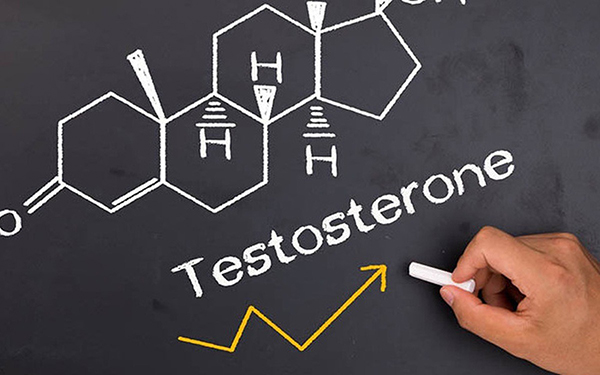Height is a significant aspect of human growth and development, often influencing an individual’s self-esteem and confidence. While genetics play a major role in determining one’s height, hormones also contribute to this process. Among the various hormones in the body, testosterone, primarily known for its role in male sexual characteristics, has been a topic of interest when it comes to its potential impact on height. In this article, we will explore the relationship between testosterone and height to gain a better understanding of how they might be interconnected.
What is Testosterone?
Testosterone is a hormone that belongs to the androgen group, primarily found in males but also present in smaller quantities in females. It is produced mainly in the testes in men and the ovaries in women, with additional production occurring in the adrenal glands.
This steroid hormone plays a crucial role in the development of male sexual characteristics during puberty and adolescence. It is responsible for the growth of facial hair, deepening of the voice, development of muscle mass, and the appearance of Adam’s apple. Additionally, testosterone contributes to the growth and maintenance of reproductive tissues, such as the testes and prostate in males.
During adolescence, testosterone levels rise significantly, leading to various physical changes in both boys and girls. In boys, it triggers the growth spurt and development of secondary sexual characteristics. In girls, it contributes to the growth of body hair and changes in body shape.
Beyond its role in sexual development, testosterone also has an impact on bone density, fat distribution, and overall energy levels. It influences mood, libido, and even cognitive functions. Throughout adulthood, testosterone continues to play a crucial role in maintaining muscle mass, bone health, and overall well-being.
While testosterone is often associated with male characteristics, it is essential for both genders. In males, it is essential for reproductive health and overall masculinity. In females, it contributes to sexual function and plays a role in maintaining bone density and muscle mass.
Overall, testosterone is a vital hormone that plays diverse roles in the human body, impacting physical development, reproductive functions, and overall health throughout life.

Does Testosterone Affect Height?
Yes, testosterone does have an effect on height, especially during puberty and adolescence. Testosterone is a hormone primarily produced in males by the testicles and in smaller amounts in females by the ovaries. During puberty, both boys and girls experience a growth spurt, but testosterone plays a more significant role in the growth and development of males.
During the growth spurt, bones grow longer, and growth plates at the ends of long bones are responsible for this increase in height. Testosterone, along with other growth hormones, helps to accelerate the closure of these growth plates, leading to the completion of bone growth and ultimately stopping further height increase.
In general, males tend to have higher levels of testosterone than females, and this is one of the reasons why men are, on average, taller than women. However, it’s important to note that genetics and other factors also play a crucial role in determining a person’s final height.
Testosterone levels can vary among individuals, and abnormal levels during growth and development may lead to growth-related issues. For instance, conditions like delayed or early puberty or hormonal imbalances can impact height outcomes.
It’s essential to remember that height is a complex trait influenced by various factors, including genetics, hormones, nutrition, and overall health. While testosterone is one of the contributing factors, it is not the sole determinant of a person’s height.
What exercises can increase testosterone levels?
Regular physical exercise can help increase testosterone levels, especially when combined with a healthy lifestyle. Here are some types of exercises that have been shown to positively impact testosterone levels:
- Resistance Training: Engaging in strength training exercises, such as weightlifting, can be highly effective in boosting testosterone levels. Compound exercises like squats, deadlifts, bench presses, and overhead presses, which involve multiple muscle groups, are particularly beneficial.
- High-Intensity Interval Training (HIIT): HIIT involves short bursts of intense exercise followed by brief periods of rest. This type of training has been linked to increased testosterone levels, particularly in young and active individuals.
- Calisthenics: Bodyweight exercises like push-ups, pull-ups, dips, and bodyweight squats can also stimulate testosterone production.
- Cardiovascular Exercise: While not as effective as resistance training, moderate aerobic exercises like running, swimming, or cycling can still have a positive impact on testosterone levels.
- Compound Movements: Exercises that engage multiple muscle groups simultaneously are generally more effective at boosting testosterone compared to isolated movements targeting a single muscle.
- Rest and Recovery: Sufficient rest and recovery between workout sessions are essential for maintaining healthy testosterone levels. Overtraining and inadequate rest can lead to decreased testosterone production.
- Maintain Healthy Body Fat Levels: Obesity or excessively low body fat can negatively impact testosterone levels. Engaging in regular exercise and maintaining a healthy diet can help manage body fat and support optimal hormone balance.
- Sunlight Exposure: Vitamin D is crucial for testosterone production, and sunlight is an excellent natural source of this vitamin. Outdoor exercises can help ensure you get enough sunlight exposure.
- Minimize Stress: Chronic stress can lead to hormonal imbalances, including reduced testosterone levels. Incorporating stress-reducing activities like meditation, yoga, or spending time in nature can be beneficial.
What do testosterone levels help?
Testosterone is a hormone that plays a vital role in various aspects of a person’s health and well-being, particularly in males. Some of the essential functions and effects of testosterone in the body include:
- Sexual Development: Testosterone is responsible for the development of male sexual characteristics during puberty. It stimulates the growth of the penis and testes, promotes the growth of facial and body hair, and deepens the voice.
- Sperm Production: Testosterone plays a crucial role in sperm production (spermatogenesis) and fertility in men.
- Sexual Function: Testosterone is involved in regulating libido (sex drive) and sexual function. It helps maintain erectile function and contributes to sexual arousal.
- Muscle Mass and Strength: Testosterone is an anabolic hormone, meaning it supports muscle growth and maintenance. It helps increase muscle mass and strength when combined with resistance training.
- Bone Density: Testosterone is essential for maintaining bone density and strength. It helps prevent osteoporosis and supports overall bone health.
- Red Blood Cell Production: Testosterone stimulates the production of red blood cells, which are crucial for delivering oxygen throughout the body.
- Mood and Cognitive Function: Testosterone can influence mood, energy levels, and cognitive function. Low testosterone levels have been associated with mood changes, fatigue, and reduced mental clarity.
- Fat Distribution: Testosterone can affect fat distribution in the body. Low levels may lead to increased body fat, particularly in the abdominal area.
- Metabolism: Testosterone plays a role in regulating metabolism and energy expenditure.
- Cardiovascular Health: Testosterone is believed to have a protective effect on cardiovascular health, helping to maintain healthy blood vessels and reduce the risk of heart disease.
What foods help boost testosterone levels?
Testosterone is an essential hormone in both men and women, but it plays a more significant role in men regarding muscle mass, bone density, and reproductive health. While the impact of these foods may not be massive, incorporating them into a balanced diet can be beneficial. Here are some foods that are thought to have a positive influence on testosterone levels:
- Tuna: Tuna is rich in vitamin D, which is linked to higher testosterone levels. It also contains omega-3 fatty acids, which are beneficial for overall health.
- Eggs: Eggs are a great source of protein and cholesterol, which is a precursor to testosterone production. However, it’s essential to consume eggs in moderation, considering cholesterol intake.
- Shellfish: Shellfish like oysters are rich in zinc, a mineral crucial for testosterone production. Zinc deficiency has been associated with low testosterone levels.
- Cruciferous vegetables: Vegetables like broccoli, cauliflower, and cabbage contain indole-3-carbinol, which may help reduce estrogen levels, indirectly promoting a favorable testosterone-to-estrogen ratio.
- Fortified plant milks: Some plant-based milks (such as soy milk or almond milk) are fortified with vitamin D and calcium, which could potentially help with testosterone levels.
- Pomegranates: Pomegranates are rich in antioxidants, which can help reduce oxidative stress and inflammation, potentially supporting testosterone production.
- Ginger: This spice has been suggested to have a positive impact on testosterone levels and reproductive health in men.
- Extra virgin olive oil: Healthy fats, such as those found in extra virgin olive oil, are essential for hormone production and may support testosterone levels.
- Lean meats: Chicken, turkey, and lean beef are good sources of protein and provide zinc and saturated fat, which is necessary for testosterone synthesis.
- Garlic: Garlic contains allicin, a compound known to increase testosterone levels, although more research is needed to confirm this effect in humans.
What else can you do to boost testosterone levels?
Boosting testosterone levels can involve various lifestyle changes and habits. Here are some additional strategies that may help promote healthy testosterone levels:
- Regular exercise: Engaging in both cardiovascular exercises (like jogging, swimming, or cycling) and resistance training (weightlifting, bodyweight exercises) can stimulate testosterone production. Focus on compound exercises that work multiple muscle groups, as they tend to have a more significant impact on testosterone levels.
- Maintain a healthy weight: Being overweight or obese can lead to lower testosterone levels. Losing excess body fat through a balanced diet and regular exercise can help improve hormonal balance.
- Adequate sleep: Getting enough quality sleep (7-9 hours per night for most adults) is crucial for hormone production and overall well-being, including testosterone levels.
- Stress management: Chronic stress can contribute to hormonal imbalances, including decreased testosterone. Incorporate stress-reducing practices such as meditation, yoga, deep breathing exercises, or spending time in nature.
- Limit alcohol consumption: Excessive alcohol intake can lower testosterone levels. If you drink, do so in moderation.
- Quit smoking: Smoking is associated with lower testosterone levels, so quitting smoking can be beneficial for hormone health.
- Vitamin and mineral supplements: In cases of deficiency, supplementing with vitamins and minerals like vitamin D and zinc may help support testosterone levels. However, it’s essential to consult with a healthcare professional before taking any supplements, as excessive doses can be harmful.
- Avoid overtraining: While regular exercise is beneficial, excessive training and inadequate recovery can lead to elevated cortisol levels, which may negatively affect testosterone production.
- Healthy fats: Include sources of healthy fats in your diet, such as avocados, nuts, seeds, and fatty fish, as these are essential for hormone synthesis.
- Limit processed foods and sugar: A diet high in processed foods and added sugars may contribute to insulin resistance and lower testosterone levels. Opt for whole, nutrient-dense foods instead.
- Intermittent fasting: Some studies suggest that intermittent fasting might have a positive impact on testosterone levels, but more research is needed to fully understand its effects.

How to choose the best testosterone?
Choosing the best testosterone approach involves careful consideration of various factors, including your health status, goals, and preferences. If you’re looking to address low testosterone levels or optimize hormonal balance, here are some steps to guide you:
Consult with a healthcare professional: Before making any decisions regarding testosterone therapy or supplements, it’s crucial to consult with a qualified healthcare professional, such as an endocrinologist or urologist. They can assess your hormone levels, overall health, and medical history to determine if testosterone intervention is appropriate for you.
Identify the underlying cause: Low testosterone levels can result from various factors, such as age, medical conditions, medications, or lifestyle habits. Understanding the root cause of your low testosterone will help guide the appropriate treatment plan.
Consider lifestyle changes: In some cases, making lifestyle adjustments like improving diet, exercising regularly, managing stress, and getting sufficient sleep can help boost testosterone levels naturally.
Testosterone therapy options: If lifestyle changes alone are insufficient, your healthcare provider may recommend testosterone therapy. There are different forms of testosterone replacement therapy, including:
- Intramuscular injections: These are typically given every few weeks and provide a sustained release of testosterone.
- Transdermal patches: These patches are applied to the skin and deliver a steady flow of testosterone.
- Gels: Testosterone gels are applied to the skin daily and are absorbed through the skin.
Pellets: Testosterone pellets are implanted under the skin and slowly release testosterone over several months.
Risks and benefits: Understand the potential risks and benefits of testosterone therapy. While it can improve certain symptoms associated with low testosterone, there are also potential side effects and risks that your healthcare provider will discuss with you.
Monitoring and follow-up: If you decide to undergo testosterone therapy, it’s essential to have regular follow-up visits with your healthcare provider. They will monitor your hormone levels and overall health to ensure the treatment is safe and effective.
Natural supplements: Some individuals may opt for natural testosterone-boosting supplements. However, it’s essential to approach these with caution and only use them under the guidance of a healthcare professional. Many over-the-counter supplements may not have sufficient evidence to support their efficacy or safety.
Avoid illegal sources: It’s important to note that anabolic steroids or testosterone obtained without a prescription can be dangerous and illegal. Stick to prescribed medications and therapies under the supervision of a healthcare provider.
Conclusion
In conclusion, while testosterone does play a role in growth and development during puberty, its direct impact on height is relatively minor compared to genetic factors and overall health. Height is a complex interplay of genetics, hormones, nutrition, physical activity, and sleep patterns. For individuals with height concerns, seeking medical advice from a healthcare professional is crucial to understanding the underlying factors and exploring suitable options.
- Related post: Does Sleeping Straight Make You Taller?

Erik Kelly with more than 30 years of working in the field of technology and games. Erik Kelly will answer all your questions related to the latest technology products, new game reviews at Timrim.com website.